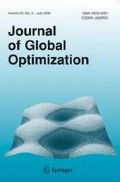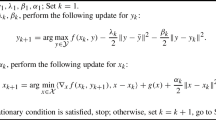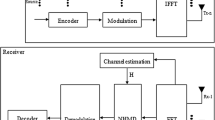Abstract
Channel coding aims to minimize the errors that occur during the transmission of digital information from one place to another. Low-density parity-check codes can detect and correct transmission errors if one encodes the original information by adding redundant bits. In practice, heuristic iterative decoding algorithms are used to decode the received vector. However, these algorithms may fail to decode if the received vector contains multiple errors. We consider decoding the received vector with minimum error as an integer programming (IP) problem and propose a branch-and-price method for its solution. We improve the performance of our method by introducing heuristic feasible solutions and adding valid cuts to the mathematical formulation. Our computational experiments reveal that our branch-cut-and-price algorithm significantly improves solvability of the problem compared to a state-of-the-art IP decoder in the literature and has superior error performance than the conventional sum-product algorithm.












Similar content being viewed by others
References
Arikan, E.: A performance comparison of polar codes and reed-Muller codes. IEEE Commun. Lett. 12(6), 447–449 (2008)
Barman, S., Liu, X., Draper, S.C., Recht, B.: Decomposition methods for large scale LP decoding. IEEE Trans. Inf. Theory 59(12), 7870–7886 (2013)
Berlekamp, E., McEliece, R., Van Tilborg, H.: On the inherent intractability of certain coding problems. IEEE Trans. Inf. Theory 24(3), 384–386 (1978)
Burshtein, D.: Iterative approximate linear programming decoding of LDPC codes with linear complexity. IEEE Trans. Inf. Theory 55(11), 4835–4859 (2009)
Chertkov, M., Stepanov, M.G.: An efficient pseudocodeword search algorithm for linear programming decoding of LDPC codes. IEEE Trans. Inf. Theory 54(4), 1514–1520 (2008)
Feldman, J., Wainwright, M.J., Karger, D.R.: Using linear programming to decode binary linear codes. IEEE Trans. Inf. Theory 51(3), 954–972 (2005)
Fossorier, M.P., Mihaljevic, M., Imai, H.: Reduced complexity iterative decoding of low-density parity check codes based on belief propagation. IEEE Trans. Commun. 47(5), 673–680 (1999)
Gallager, R.: Low-density parity-check codes. IRE Trans. Inf. Theory 8(1), 21–28 (1962)
Hu, X.-Y., Eleftheriou, E., Arnold, D.-M., and Dholakia, A.:Efficient implementations of the sum-product algorithm for decoding LDPC codes. In: GLOBECOM’01. IEEE Global Telecommunications Conference (Cat. No. 01CH37270), vol. 2, pp. 1036–1036E. IEEE (2001)
Karger, D.R., Oh, S., Shah, D.: Budget-optimal task allocation for reliable crowdsourcing systems. Oper. Res. 62(1), 1–24 (2014)
Kschischang, F.R., Frey, B.J., Loeliger, H.-A., et al.: Factor graphs and the sum-product algorithm. IEEE Trans. Inf. Theory 47(2), 498–519 (2001)
Lau, F. C., Mo, F., Tarn, W. M., Sham, C.-W.: Random-permutation-matrix-based cyclically-coupled LDPC codes. In: 2017 19th International Conference on Advanced Communication Technology (ICACT), pp. 497–500. IEEE (2017)
Leiner, B.M.: LDPC codes—a brief tutorial. 8:1–9 (2005)
Lübbecke, M.E.: Column generation. Wiley. In: Wiley Encyclopedia of Operations Research and Management Science (2010)
Lübbecke, M.E., Desrosiers, J.: Selected topics in column generation. Oper. Res. 53(6), 1007–1023 (2005)
MacKay, D.J.: Good error-correcting codes based on very sparse matrices. IEEE Trans. Inf. Theory 45(2), 399–431 (1999)
MacKay, D.J.: Information Theory, Inference and Learning Algorithms. Cambridge University Press, Cambridge (2003)
MacKay, D.J., Neal, R.M.: Near Shannon limit performance of low density parity check codes. Electron. Lett. 33(6), 457–458 (1997)
Moon, T.K.: Error Correction Coding: Mathematical Methods and Algorithms. Wiley, New York (2005)
Richardson, T.J., Urbanke, R.L.: The capacity of low-density parity-check codes under message-passing decoding. IEEE Trans. Inf. Theory 47(2), 599–618 (2001)
Sarajlić, M., Liu, L., and Edfors, O.: Reducing the complexity of LDPC decoding algorithms: An optimization-oriented approach. In: 2014 IEEE 25th Annual International Symposium on Personal, Indoor, and Mobile Radio Communication (PIMRC), pp. 861–866. IEEE (2014)
Tanatmis, A., Ruzika, S., Hamacher, H.W., Punekar, M., Kienle, F., Wehn, N.: A separation algorithm for improved LP-decoding of linear block codes. IEEE Trans. Inf. Theory 56(7), 3277–3289 (2010)
Tanner, R.: A recursive approach to low complexity codes. IEEE Trans. Inf. Theory 27(5), 533–547 (1981)
Vontobel, P.O., Koetter, R.: On low-complexity linear-programming decoding of LDPC codes. Eur. Trans. Telecommun. 18(5), 509–517 (2007)
Yang, K., Feldman, J., Wang, X.: Nonlinear programming approaches to decoding low-density parity-check codes. IEEE J. Sel. Areas Commun. 24(8), 1603–1613 (2006)
Yang, K., Wang, X., Feldman, J.: A new linear programming approach to decoding linear block codes. IEEE Trans. Inf. Theory 54(3), 1061–1072 (2008)
Zhang, X., Siegel, P.H.: Adaptive cut generation algorithm for improved linear programming decoding of binary linear codes. IEEE Trans. Inf. Theory 58(10), 6581–6594 (2012)
Zhang, X., Siegel, P.H.: Efficient iterative LP decoding of LDPC codes with alternating direction method of multipliers. In: 2013 IEEE International Symposium on Information Theory, pp. 1501–1505. IEEE (2013)
Acknowledgements
This research has been supported by the Turkish Scientific and Technological Research Council with Grant No. 113M499.
Author information
Authors and Affiliations
Corresponding author
Additional information
Publisher's Note
Springer Nature remains neutral with regard to jurisdictional claims in published maps and institutional affiliations.
Rights and permissions
About this article
Cite this article
Kabakulak, B., Taşkın, Z.C. & Pusane, A.E. A branch-cut-and-price algorithm for optimal decoding in digital communication systems. J Glob Optim 81, 805–834 (2021). https://doi.org/10.1007/s10898-021-01073-4
Received:
Accepted:
Published:
Issue Date:
DOI: https://doi.org/10.1007/s10898-021-01073-4




